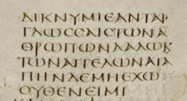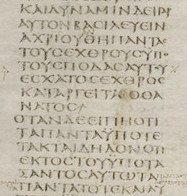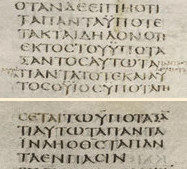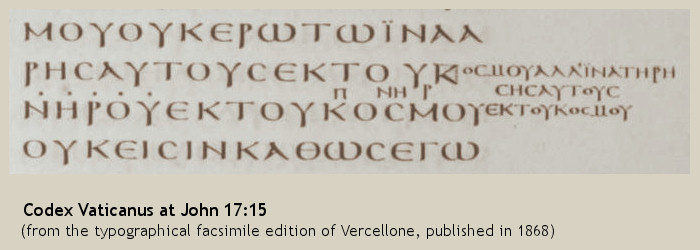
| Bible Research > Textual Criticism > Critical Use of Manuscripts |
by Michael Marlowe
April, 2011
Codex Sinaiticus is often defective, omitting a large number of words. Why then is it esteemed by critics? Because it is possible to use a manuscript with discernment, making allowances for its characteristic errors. Most of the omissions in Codex Sinaiticus have occurred by reason of a common mistake of copyists called parablepsis (παράβλεψις, looking beside) due to a homoiotéleuton (ὁμοιοτέλευτον, an identical ending) of words in the immediate context. The scribe of Sinaiticus was especially prone to make this mistake. These omissions are readily recognized. Below are three examples. In the following passages the words crossed out are omitted in Sinaiticus.
| 1 Cor. 13:1-2 | ||
 |
εαν ταις γλωσσαις των αθρωπων λαλω κ(αι) των αγγελων αγαπην δε μη εχω γεγονα χαλκος ηχων η κυμβαλον αλαλαζον και εαν εχω προφητειαν και ειδω τα μυστηρια παντα και πασαν την γνωσιν και εαν εχω πασαν την πιστιν ωστε ορη μεθιστανειν αγαπην δε μη εχω ουθεν ειμι | Though I speak with the tongues of men and of angels, and have not charity, I am become as sounding brass, or a tinkling cymbal. And though I have the gift of prophecy, and understand all mysteries, and all knowledge; and though I have all faith, so that I could remove mountains, and have not charity, I am nothing. |
Here the scribe had copied the verse up to the end of the first occurrence of the phrase αγαπην δε μη εχω “and have not charity,” but when he looked up to his example again to continue copying, his eye fell upon the second occurrence of the phrase, from which he continued, omitting all of those words between the two occurrences of the phrase. Now a more complicated example:
| 1 Cor. 15:25-27 | ||
 |
δει γαρ αυτον βασιλευειν αχρις ου αν θη παντας τους εχθρους υπο τους ποδας αυτου εσχατος εχθρος καταργειται ο θανατος παντα γαρ υπεταξεν υπο τους ποδας αυτου οταν δε ειπη οτι παντα υποτετακται δηλον οτι εκτος του υποταξαντος αυτω τα παντα | For he must reign, till he hath put all enemies under his feet. The last enemy that shall be destroyed is death. For he hath put all things under his feet. But when he saith, All things are put in subjection, it is evident that he is excepted who did subject unto him all things. |
Here it is not immediately clear what has happened. But when it is known that in some early manuscripts the order of clauses is as shown below, once again we see that the scribe’s eye has jumped from the first occurrence of a phrase to the second occurrence:
| δει γαρ αυτον βασιλευειν αχρις ου αν θη παντας τους εχθρους υπο τους ποδας αυτου παντα γαρ υπεταξεν υπο τους ποδας αυτου εσχατος εχθρος καταργειται ο θανατος οταν δε ειπη οτι παντα υποτετακται δηλον οτι εκτος του υποταξαντος αυτω τα παντα | For he must reign, till he hath put all enemies under his feet. For he hath put all things under his feet. The last enemy that shall be destroyed is death. But when he saith, All things are put in subjection, it is evident that he is excepted who did subject unto him all things. |
The scribe’s eyes have jumped from the first υπο τους ποδας αυτου “under his feet” to the second. And in the very next verse we find another such omission, as his eyes jump from one αυτω τα παντα to the next:
| 1 Cor. 15:27-28 | ||
 |
οταν δε ειπη οτι τα παντα υποτετακται δηλον οτι εκτος του υποταξαντος αυτω τα παντα οταν δε υποταγη αυτω τα παντα τοτε και αυτος ο υιος υποταγησεται τω υποταξατι αυτω τα παντα ινα η ο θς τα παντα εν πασιν | But when he saith, All things are put in subjection, it is evident that he is excepted who did subject unto him all things. And when there shall be subjected unto him all things, then shall the Son also himself be subject unto him that put all things under him, that God may be all in all. |
These homoiotéleuton omissions number about 300 in the New Testament of Codex Sinaiticus. And because they are readily recognized as scribal errors, they are not taken seriously as various readings by the editors of critical editions. The three omissions used for examples above, and many more like them, are not even mentioned in the notes of the critical editions currently used by translators.
Other omissions are taken more seriously, however, especially when they are confirmed by Codex Vaticanus and other manuscripts of better quality. Sinaiticus is also regarded more highly as a good witness in the case of substitutions and additions. The scribe of Sinaiticus was not given to making capricious substitutions and additions. Other scribes were guilty of this fault, as may be seen from Codex Claromontanus, for instance, which is another very old manuscript. And so even the oldest manuscripts are not followed blindly, but intelligently.
Regarding Vaticanus: it is much better than Sinaiticus, and but it also has its fauts. We find, for example, an unfortunate homoiotéleuton omission in John 17:15, where the manuscript reads οὐκ ἐρωτῶ ἵνα ἄρῃς αὐτοὺς ἐκ τοῦ πονηροῦ “I do not ask that you take them out of the evil one” instead of οὐκ ἐρωτῶ ἵνα ἄρῃς αὐτοὺς ἐκ τοῦ κόσμου, ἀλλ᾽ ἵνα τηρήσῃς αὐτοὺς ἐκ τοῦ πονηροῦ “I do not ask that you take them out of the world, but that you keep them out of the evil one.”

This reading, which quite destroys the sense of the verse, obviously arose from an accidental omission of the words between the two occurrences of αὐτοὺς ἐκ τοῦ. Fortunately it was noticed by a later scribe, who erased the Π of ΠΟΝΗΡΟΥ, wrote a Κ over it, and added the missing words in the margin. But from this we see that Vaticanus is not to be used uncritically either; it requires correction, and, like any other manuscript, its readings must be confirmed by other early witnesses. The same is true of all manuscripts, no matter how early.
It is important to recognize the need for a diversity of witnesses from different regions. Critics aim to recover the readings of Catholic Antiquity, and guard against regionalisms. It is often asserted by Majority text advocates that the modern critical texts are distinctively Egyptian, that they rely uncritically upon Sinaiticus and Vaticanus, or upon manuscripts which all came from Egypt. This is simply untrue. The Greek copies used by the critical editors are indeed mostly from Egypt, but these are also compared with quotations and early versions from all quarters of the ancient world.
| Bible Research > Textual Criticism > Critical Use of Manuscripts |